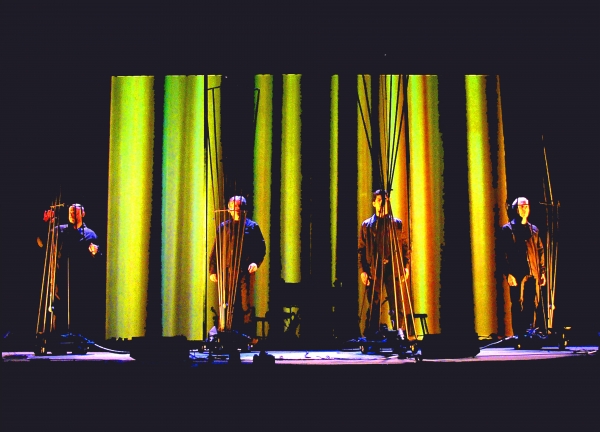The Kronos Quartet is anything but your typical string ensemble. Photograph by Zoran Orlic
The Kronos Quartet—the pioneering ensemble which opened the fifth year of its residency at College Park’s Clarice Smith Center on Friday night—is a string quartet, but really it is not. The appeal of a traditional string quartet’s performance is in the appreciation of the warm tone of the four instruments. A small and intimate room, with a warm acoustic and a silent and attentive audience, is an essential part of this cult of beautiful sound, allowing the blend of four excellent musicians to reach your ear. Families and friends used to gather, and sometimes still do, to play string quartets in living rooms, but modern string instruments, with more resonant steel strings, can often overpower too small a room, just as they are lost in one too large. Washingtonians have many opportunities to hear this kind of concert in an optimal setting, for example, on the best historical instruments available, in the superb auditorium of the Library of Congress.
That is not what the Kronos Quartet does, and anyone with those expectations will be disappointed by their performances. A Kronos concert veers into the territory of theater, with lighting concepts, a fully darkened house, and atmospheric recorded tracks associated with many of the pieces they play. The musicians plug cords into their instruments, which amplify and otherwise transform the sound they produce. This was evident right from the start of this concert, when recorded sounds of dripping water opened Oasis (1998). The piece was an evocation of the allure of water in the desert, composed for the Kronos Quartet by the Azerbaijani composer Franghiz Ali-Zadeh. The musicians imitated this sound with a pizzicato motif, disappearing as the piece grew over a gentle arc, marked with melodic references to traditional Azerbaijani scales, with the drips of water returning at the conclusion.
This strange, colorful work was matched nicely to Jacob Garchik’s arrangement (made specifically for the Kronos Quartet) of Laurie Anderson’s Flow, the song that was nominated for a Best Pop Instrumental Performance Grammy last year. As heard here, the piece is little more than a series of gently ebbing sustained triads, played in a muted stasis of hazy harmonies, short but sweet. For Missy Mazzoli’s Harp and Altar, the members of the quartet each put an earpiece into one ear, for a work in which they timed their playing to a recording, sampling vocals by Gabriel Kahane. The work, a paean to the Brooklyn Bridge, is repetitive in a way that is intended to be hypnotic but that grew dull.
Even more irksome was the final piece on the first half, Death to Kosmische (2010), a noisome exploration of “hauntology” by Canadian composer Nicole Lizée. Distortion of the string instruments produced sounds like radio feedback, a dentist’s drill, and buzzing space tools of some kind (the memory of the “cosmic music” of the title). This was the music of your nightmares—or at least of a Simpsons Halloween episode—with the players even setting aside their instruments to offer laugh-inducing solos on Omnichord and Stylophone, as well as a little box with glowing lights that made screeching noises. It was nostalgic, in the sense that one expected Galaga and the other video games of one’s youth to start up on the back curtain in response to these noises, but the effect was mostly just silly.
The most worthy piece, by far, was the world premiere of Babylon, Our Own, commissioned by the Clarice Smith Center (for its tenth anniversary), specifically for the Kronos Quartet, from Serbian-born composer Aleksandra Vrebalov. Once again recorded sounds provided a basis for motifs in the strings, here slides and other indistinct sounds, a sonic envelope for the entrance of the outstanding clarinet soloist, David Krakauer. The waves of sound included hints of bird calls (that seemed to mutate into urgently beeped Morse code at one point), the wail of klezmer high clarinet, pulsing rock beats, terrified shrieks of human voices, vocal cantillation, buzzing outer space noises, and a melancholy waltz that turned bluesy. It easily could have become a hodge podge of annoying sounds (as Lizée’s piece was), but it was organized formally in ways that could be followed but that were not predictable. This promising new work was followed by three encores, more ear-pleasing candy of the World Music Lite variety.
One final point: Attentive readers will have noted that all of the music performed on this concert was composed by women. No mention was made of this in the program or the publicity materials for the event, nor was the concert scheduled for Women’s History Month or in connection with any other special event. Kudos to the Kronos Quartet for programming it, and for not drawing special attention to it.
The Kronos Quartet will return to the Clarice Smith Center for concerts in February, including a collaboration with dance artists Eiko and Koma.
Subscribe to Washingtonian
Follow Washingtonian on Twitter
Follow the After Hours Blog on Twitter
More>> After Hours Blog | Arts & Events | Happy Hour Finder | Calendar of Events

















